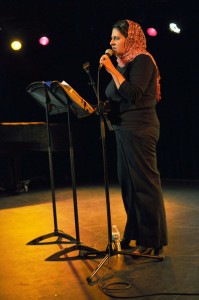Author shatters common stereotypes of Muslim life
On Monday, Mohja Kahf reminded everyone that performance literature can be one of the most engaging forms of entertainment.
Professor of comparative literature at the University of Arkansas, author of the acclaimed novel The Girl in the Tangerine Scarf, and writer of poetry on a wide range of topics, Kahf gave a thought-provoking and educational performance of her work at Ground Zero.

Spoken word · Mohja Kahf mixed passionate readings about oppression with satirical pieces on everyday life as a Muslim woman. - Hayden Bennett | Daily Trojan
Kahf began with an ode to the surrogate mother of Moses and a piece about the hardships experienced by people under oppressive governments. Beginning with a lyrical song in Arabic, Kahf continued her poem in English and broadened its scope to current events. With passion, she voiced her disagreement with those who use their religion to justify violence and kept the audience’s attention by using strong imagery as she expressed her thoughts on the repression of speech.
After this heavy poem, which created a serious atmosphere in the room, Kahf continued with a lighter reading of four poems about Ramadan. The first referenced Ramadan in the West.
“There is no shopping ‘til dawn,” Kahf read in a poem about the differences between Ramadan and Christmas. “We do it hardcore and hungry, the old prophet way.”
Her next piece continued the sarcastic and witty tone she maintained through most of her performance. In the poem, she showed her original point of view by referencing the other “fasting” that goes on during Ramadan: sex.
She gave the poem a balance of class and humor with her eloquent descriptions of people simply not wanting to have sex paired with a playful discussion that Ramadan is “not a time for thongs.”
The following poem, “In Utero Fasting Academy,” referenced women who believe that fasting during Ramadan will harm their pregnancy. Kahf jokingly used her daughter’s good SAT scores as evidence against that idea.
Kahf’s varying rhythm and language throughout the presentation kept the audience entertained and showed her unique perspective on Islamic culture and feminism. Her poem “Khadija Gets Her Groove Back” described the prophet Mohammad through his wife’s eyes, in a sensual, lyrical way. This description, paired with the fact that she recited the poem as though Khadija was speaking with her barber, put a humorous spin on the solemn topic of characterizing Mohammad.
When asked about reactions to her references to sexuality during the post-reading question and answer session, Kahf justified her work by relating religion back to reality.
“[Muslim women] enjoy bringing these figures to a human light,” she said. “Sensuality is part of life.”
Kahf’s insistence on audience participation stood out during her performance. In one poem she had the audience finishing her sentence “I love a man…” with “…who washes my dishes.”
This got the audience laughing throughout the poem. In a reading of the short story Girl from Mecca, she had three audience members call out “Oppression! Oppression! Oppression!” when gullible characters were fooled by a girl’s falsified story about her clichéd experience as a Muslim woman.
This story in particular echoed Kahf’s focus on the misunderstanding of Islam and Muslim women by non-Muslims. It was full of exaggerated perceptions of Muslims; Kahf succeeded in relaying the stereotypes of non-Muslims believing that all Muslim women endure suffering and oppression, while also satirizing two conservative Muslim women in her story who were appalled by the antics of a rebellious 17-year-old Muslim girl.
Kahf used cartoonish characters, sometimes exaggerated to the point of ridiculousness, to demonstrate her opinions on how Muslim women are viewed and how non-Muslims should view them.
“They are not projecting the victim,” Kahf said about Muslim women who wear hijabs or niqabs, the head coverings traditionally worn by Muslim women.
Kahf said she believes strongly in the freedom of choice of Muslim women and their right to express their religion. She drove home her support of women who are satisfied with their identities with her excerpt from The Girl in the Tangerine Scarf. The passage focused on the beauty and significance of the scarves, without Kahf’s characteristic sarcasm and wit.
Although much of her reading was focused on her feelings about culture and race, Kahf broke away from commenting on Muslim identity to write about other issues.
When asked about her obligations to relay her views on Islamic culture to her audience, she said, “I respond to it sometimes and sometimes say, ‘Just screw it.’”
